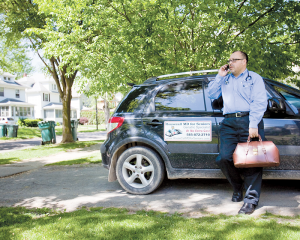Some doctors in the area can provide you with home visits and 24/7 availability — and it’s less expensive than you think
By Deborah Jeanne Sergeant

Want a doctor who really knows you and offers 24/7 availability or even house calls? These options have become reality as physicians reinvent how they provide care.
A few doctors in the area have begun offering alternative ways to deliver care, and not just because they want to enhance their patients’ experience.
As margins grow thinner and thinner in the healthcare industry, many providers take on additional patients to receive adequate reimbursement from insurers. Since they can’t add more hours to the day, this means that each patient receives less time during visits. Physicians in general also have little opportunity to develop a close patient/doctor relationship. If they increase the number of visits they schedule, they must work longer hours, which affects their quality of life.
All of these factors add up to less satisfaction for doctors and patients. Some have turned to offering retainer-based care, sometimes called concierge medical care.
Nora E. Meaney-Elman, a primary care physician who owns and operates a self-named practice in Williamsville, believes that affiliation with MDVIP (www.mdvip.com) for the past year has helped her solve the problem.
MDVIP, a patient-centered wellness program headquartered in Boca Raton, Fla., provides physicians with more direct access to providers for an annual fee. The program focuses on wellness and prevention as keys to good health.
Meaney-Elman offers an out-of-pocket wellness program that centers around an “executive physical” which lasts an hour, instead of the usual half hour with just 15 minutes provided by a physician.
The physical includes onsite testing for audiology, pulmonary, vision and cardiology health needs. Lab tests and other screenings help assess patient health and benchmark vital numbers.
“I was drawn to this for this for a variety of reasons,” Meaney-Elman said. “I always had a patient-centered practice, but the mandates from government and insurance companies with electronic records depersonalized our relationship. It fragmented offices more and more. Ultimately, this is the most sensible plan I’ve seen.”
Through her affiliation with MDVIP, she can link to top specialists nationwide to consult on tougher cases. She participates with insurance and bills them for services delivered on-site.
“Most of the insurance companies find there’s a lot of value in these programs because we keep people out of the hospital,” Meaney-Elman said. “We know the patient really well. In general, they and the government have recognized the role these plans play.”
Her VIP patients don’t have to wait for care, and she feels that she can empower patients to take charge of their health since she spends more time with them to help them make informed health decisions.
“It’s a joint venture in the patient’s command of the health system and that’s very gratifying,” she said.
She employs two RNs and a medical technician but she is the only person who sees patients. When she’s out of town, she refers patients to another physician.
Leonard Kaplan, osteopath who specializes in spine, sports and wellness, operates Osteopathic Wellness Medicine in Buffalo. Since many patients require a number of visits, he provides package deals with multiple modalities.
Kaplan had worked as a managing partner at a large sports medicine group for 12 years, but as insurance reimbursements tightened, he felt squeezed as overhead went up.
“What ends up happening is physicians across the country reduce the time they spend with patients and they start to employ nurse practitioners and physician assistants,” Kaplan said.
His patients have told him that at other practices, they never saw their doctors, even at their initial visits.
Kaplan felt the quality of care declined and became impersonal. Two years ago, he decided to go back to “old-style medicine,” he said. “It removes the middle man between you and the patient — you don’t have high prices. You can charge less than you would charge the insurance companies.”
He said that many physicians must inflate their prices to insurance companies to receive enough reimbursement to cover their expenses, “a ridiculous game,” Kaplan said.

He began his high-value, low-volume practice so he could spend an hour with each patient. He now knows his patients by first name. To keep his overhead low and charge patients fees they can afford, he employs only a receptionist and accepts cash payments from patients.
“There’s never any waiting,” Kaplan said. “I have four chairs in my waiting area and they’re almost always empty. That’s what it’s all about: relationship-based medicine. You know the patient. You understand them and what they need.”
He integrates wellness aspects by working with a nutritionist, yoga instructor and mindfulness counselor, among others.
“Everything I have, my team, is all available on first-service basis,” Kaplan said. “What I do that’s unique is I integrate all those services. I’m like a conductor.”
Membership is $2,000 annually, which includes multiple visits with Kaplan, and blood work.
Any procedures incur additional fees.
“It’s like a membership in a gym and I make recommendations,” Kaplan said. “I can give them a total cost.”
He does not bill insurers, though he will provide a bill if patients wish to bill their company.
“The job satisfaction is unbelievable,” Kaplan said. “I’m extremely happy and I love what I do. There’s no burnout. All those feelings like I’m getting squeezed are gone. Now I can take my time.”
He admits that his care is “not affordable for everyone” but added, “it’s the reality of medicine. It does require for a person to have some means, but the prices aren’t outrageous. The majority of my patients are not wealthy.”
To comply with the Affordable Care Act, patients must also take part in a qualified health insurance plan.

